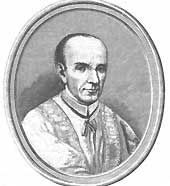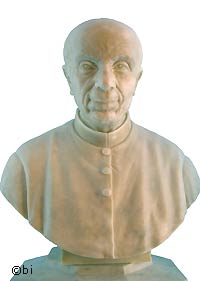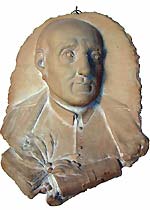Humble priest, courageous and bold, he devoted most of his life in favor of the sick, the poor and youth
The ven. Ignazio Eustachio Capizzi  Ignazio Eustachio Capizzi was born in Bronte on September 20th, 1708, son of a shepherd and a wool spinner. Ignazio Eustachio Capizzi was born in Bronte on September 20th, 1708, son of a shepherd and a wool spinner.
Of humble origins, he became orphan of father and, when he was only eight years old, was looking after some sheep and lambs for his uncle's herd.
At 11 years, still illiterate, began the first studies in Bronte, in the Oratory of S Filippo Neri, annexed to the Catena church, under the guidance of two priests and, with extreme sacrifices, continued them first in Caltagirone and then at Lipari.
When he was eighteen, to continue the studies of philosophy and theology in the Eolean islands, he worked as a servant (room chierico), for the Bishop Of Lipari. Then, in 1732 moved to Palermo and worked as a scullery boy and a nurse in the Grand and New Hospital, and started to study medicine and, in 1734, embraces the medical profession but his dream is to become a priest. He continues in Palermo the religious studies and, after years of privations, humiliations and sacrifices, in 1735 in the Maximum College Of Palermo he gets the degree in Theology, on December 17 is ordered deacon and, at 28 year of age, in May 1736, finally he reaches priesthood. He was a truly virtuous man, charitable, devoted to poverty, always humble and showing a multiform apostolic zeal.
Tireless, cultured preacher and writer, he dedicated big part of his life to help the sick and poor people and the neglected youth ignorant and guideless. Many Sicilian country towns and especially Palermo and Bronte, were witnesses of his fecund, apostolic activity and bold social initiatives as the building of public advantage works (colleges, boarding schools, institutes).  In few decades he becomes the tireless Palermo's apostle: in 1747 he builds the college of the virgins of Holy Maria Of The Carmine (destined to kindergarten the "unsafe girls"); builds an analogous college in Vicari; buys the oratory in the Teatini house and restores it; director of the Sapienza College (one of Maria's two risen colleges in Palermo), he enlarges it and restores it; enlarges and improves the girls' Reclusorio of the Hospital In Palermo; he organizes help to the dying and the convicts. In few decades he becomes the tireless Palermo's apostle: in 1747 he builds the college of the virgins of Holy Maria Of The Carmine (destined to kindergarten the "unsafe girls"); builds an analogous college in Vicari; buys the oratory in the Teatini house and restores it; director of the Sapienza College (one of Maria's two risen colleges in Palermo), he enlarges it and restores it; enlarges and improves the girls' Reclusorio of the Hospital In Palermo; he organizes help to the dying and the convicts.
In 45 years of fecund apostolate, he left memories of holinesses and prodigies also in Monreale, Nicosia, Castelvetrano, Messina, Leonforte, Alimena, Resuttana, and many other centers of Sicily. At Palermo, while in contact with colleges and scholastic institutes gets the idea to found a school for the formations of secular boys, but also new priests, in his native country town, with no schools and in nearly in total illiteracy. In Bronte whoever wanted to get an education had to leave his country town. His idea, few years later, was followed by Donna Maria Scafiti with the institution of the Collegio di Maria (1780) for girls and by Pietro Graziano Calanna who founded the "Royal Public Schools for maidens of Bronte" (1823). Ignazio Capizzi, poor, humble but highly cultured and a great organizer, conceived and built the majestic "Capizzi College" during few years. Ignazio Capizzi, poor, humble but cultured and great organizer, conceived and built the majestic "Capizzi College" during few years. The 25/6/1771 he selects the space where to build it, right in the center of town (San Rocco), and two years later he buys the land. Then sends the priest Marvuglia, architect of the Palermo Council to prepare the project and the 1st of May 1774 he blesses and puts the first stone. The construction activity lasted till 1778 and then finally on the 15th of October was celebrated the solemn opening of the school that eventually acquired so much importance and fame especially in Sicily and Southern Italy. In Bronte, the country town in which he was born and that he had left to get an education, he and built the majestic college, for the formation of secular boys but also new priests. To realize the work he had to overcome ironies and a great deal of difficulties, ostracisms, contrasts and calumnies of every kind; he went begging for the necessary resources everywhere. |